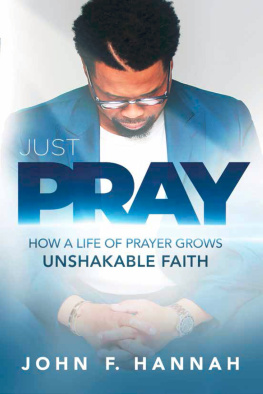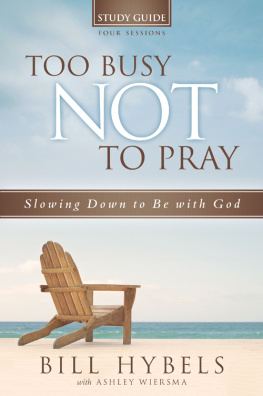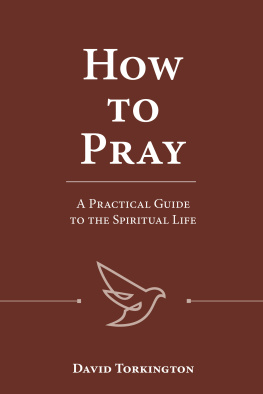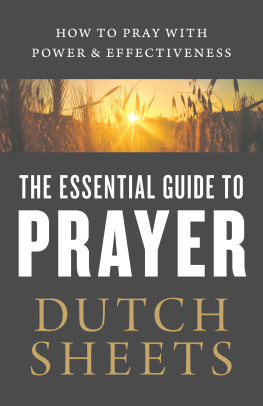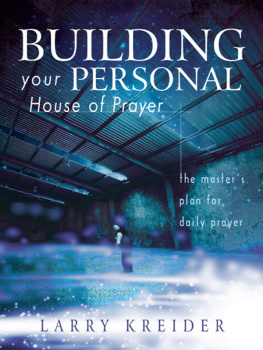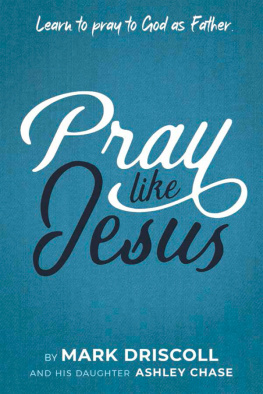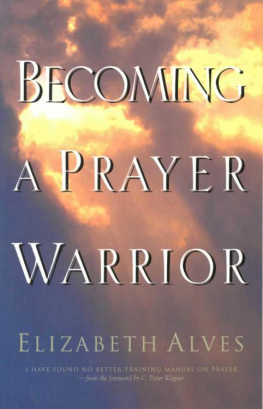You See Me, You Hear Me
A Short Guide to Prayer for Young Adults
FATHER MICHAEL GIESLER

Copyright 2012 by Michael E. Giesler.
All rights reserved.
Published by Scepter Publishers, Inc.
P.O. Box 1391
New Rochelle, NY 10802
www.scepterpublishers.org
The total or partial reproduction of this book is not permitted, nor its informatic treatment, or the transmission of any form or by any means, either electronic, mechanic, photocopy or other methods, without the prior written permission of the publisher.
Scripture texts from the New and Old Testaments are taken from The Holy Bible Revised Standard Catholic Edition 1965 and 1966 by the Division of Christian Education of the National Council of the Churches of Christ in the United States. All rights reserved. All copyrighted material is used by permission of the copyright owner.
Cover image: shutterstock.com
Cover design and interior layout by
Creative Editorial Solutions
ISBN: 978-1-59417-188-8
Printed in the United States of America
15 14 13 12 1 2 3 4
My Lord and my God, I firmly believe that you are here, that you see me, that you hear me. I adore you with profound reverence. I ask your pardon for my sins and the grace to make this time of prayer fruitful. My Immaculate Mother, St. Joseph my father and lord, my guardian angel, intercede for me.
TABLE OF CONTENTS
God thirsts that we may thirst for Him (St. Augustine, as quoted in CCC, 2560)
What an amazing and consoling statementto think that the infinite God, who made all things and sustains all things, deeply desires that we speak with him and be united to him. He does not want us to lead a lonely life, isolated from his goodness and his love. He wants to communicate with us, and us with him. Yet how many people today really know this, or have seriously thought about it?
Maybe you are one of them. Life can get very busy. There are classes to take, sports to play, people to see, and a few crises to resolve now and then. And yes, there is perhaps a whole world to manage on Facebook and an endless barrage of text messages to keep up with. Though these things are really not so important or urgent as they seem, society and your friends keep telling you that they are.
And yet there is something more to life. Theres something deep inside each of us that wants to communicate, not only through cyberspace, but in a way that is far more personal and spiritual. We call this special way prayer, and we tap into it with our minds and our hearts. We can know and loveand these two powers make us unlike anything else in the physical universe. In fact, Scripture points to God himself in order to give us a description of what we are like. The Book of Genesis puts it like this: God created man in his own image, in the image of God He created him; male and female He created them (Gn 1:27). If we forget that we are made in Gods image, with a mind for knowing him and a heart for loving him, we forget the greatest truth about ourselves, and worst of all, we will end up quite unhappy and alone.
Yet we often run from God and from who we really are. Our escape can be into mere activity or busy-ness, or into more harmful things like alcohol, pornography, or drugs. Or we can just fall into time-wasting. And yet we cannot escape the truth about ourselves, and the One for whom we were made. As soon as we understand these deeper realities and act accordinglyour life will have purpose, and well find real happiness.
Yes, God is thirsting for you and me, just as he thirsted for water at the well of Sichar, in Samaria, where he stopped after a tiring journey (see Jn 4:142). When a certain woman came to the well at midday, he asked her for a drink of water. But he was thirsting even more for her conversion, and as they spoke, he taught her to believe in him, and he changed her life. Lets engage him in conversation. Lets speak to him, and let him speak to us. Like the woman at the well, we too will be amazed at the things he tells us.
Maybe you remember a certain play of Shakespeare from your English course, either in high school or college. Its called Macbeth, the story of an ambitious Scottish noble who stopped at nothing, not even murder, to become king. At the end, when his enemies were gathering against him and he saw that his entire kingdom was crumbling, he spoke these famous words: Life is a tale told by an idiot, full of sound and fury, signifying nothing (Act V, Scene 5). That is how our life would be if we didnt have God, or if we didnt pay attention to him. But if we develop a life of prayer and virtue, with Gods grace, our life will be the opposite of Macbeths tragic sentence: It will be a tale told by Jesus Christ, full of adventure and love, signifying everything.
This book will help you to find that life. Its about prayer, especially mental prayer, and it explains how a life of prayer will liberate you and give you lasting joy. Not a frivolous, noisy kind of joy which can soon turn bitter, but a deeper, more lasting contentment that will truly sustain you. It will also show how prayer can get you through the toughest moments, when youre tempted to give up or fall into sinful or selfish behavior.
The thoughts in this book are based on Sacred Scripture, the teachings of the Catholic Church, the insights of St. Josemara Escriv, founder of Opus Dei, and other great spiritual writers.
I hope you enjoy it and benefit from it.
What is prayer? Very simply put, prayer is conversation with God. It is communication with the One who made us, through our mind, will, and feelings. It doesnt have to involve mystical visions or special phenomena, though it may. To put it in modern terms, prayer is like an instantaneous wireless connection that costs us nothing. Normally it will involve the practical and personal things of our daywhat were thinking or feeling at each moment and how they connect with God.
Prayer is above all a dialogue. This term comes from a Greek word that means a conversation between two parties. Prayer is not the same as thinking about something, or introspection, or self-awareness. It is not the same as having feelings insidesuch as joy, or anger, or sorrow. Prayer is a true communication where a human person and God interact with one another. It can involve spoken words, as in the case of vocal prayers like the Rosary, or our own interior words, as in the case of mental prayer. As a matter of fact, prayer doesnt have to involve words at all. It can simply be a silent, loving look at one another. We communicate something to God, and he to us.
Prayer is true communication between a person and God.
All of creation is the united work of the three Persons of the Blessed Trinity. This means that the three Persons of the Trinity are everywherethe Father, the Son, and the Holy Spirit. The Blessed Trinity has created and is sustaining the whole universe. We cannot think a thought, breathe a breath, or have a heartbeat without them. God is closer to us than we are to ourselves. Prayer, therefore, is really the simplest, most immediate thing we can do with Godespecially because we are made in his image and likeness, with a mind that can know him, and a will that can love him.
For this reason it doesnt matter what age you are in order to pray. Small children can speak with God (their prayers are often the simplest and best), as long as they are aware of Gods existence and that God sees and hears them. When prayer is truly developed, a person has the habit of communicating with God all day longat work, with her family, during rest. This is obtained by the persons own effort to pray each day, but above all, by Gods grace that inspires the person to speak with him.
Next page

